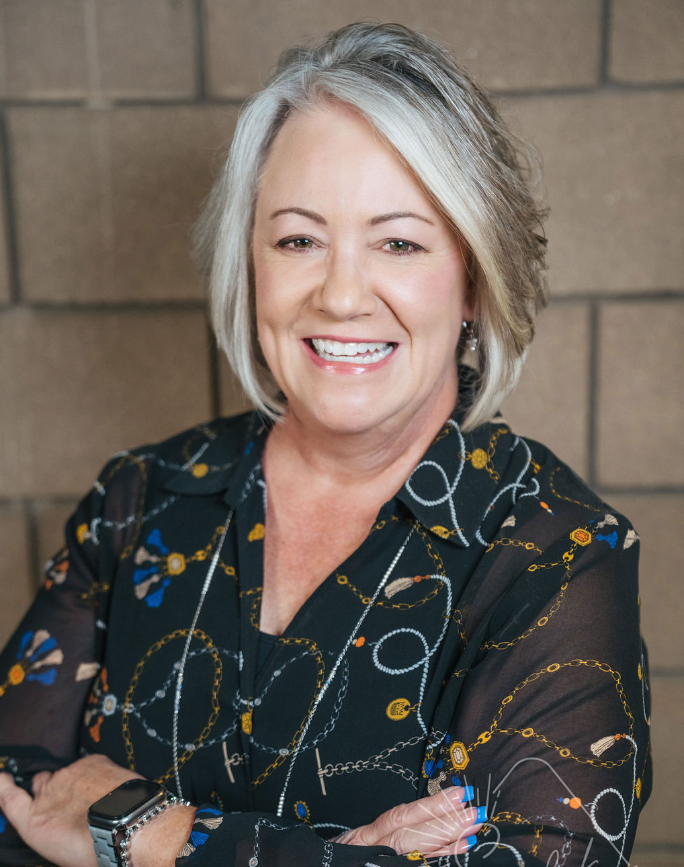Karen Koenig of KK Financial Solutions On 5 Things To Look For When Hiring a Financial Planner or Financial Adviser
Build Trust and Rapport: Establishing a trustworthy relationship with clients is crucial. Be honest, transparent, and show genuine interest in their financial goals and concerns.

As part of our series about what one should look for when hiring a financial planner or adviser, I had the pleasure of interviewing Karen Koenig with KK Financial Solutions. https://www.kkfinancialsolutions.us
Karen Koenig’s career began with 26 years in the military, where she retired as a Major. After her military career, she worked in a variety of industries, including electronics, aerospace, and defense, specializing in Project Management. Throughout her career, she discovered her passion for working with people and helping them achieve their goals using her detailed project management approach. Karen started her practice as a financial planner in 2016 with the desire to work with business owners and women looking to work on their wealth management.
. . .
Thank you so much for doing this with us! Our readers would love to ‘get to know you’ a bit more. Can you tell us a story about what brought you to this specific career path?
I was working in aerospace and got disenchanted with the company I was working for at the time. Nothing I did as a manager seemed to make a difference, and I found out I would never get promoted to an upper management position. Upper management positions were reserved for the Engineers and those who graduated from MIT.
A co-worker of mine had quit this company years before and was making it as a financial advisor. He used to be a blue-collar worker, so I figured if he could change careers into financial services without any background in finance, I could do it too!
Can you share a story about the most humorous mistake you made when you were first starting in the industry? Can you tell us what lesson or takeaway you learned from that?
I was introducing myself to the neighborhood where my office was going to be located, and I was doing what is called in the industry as “door knocking.” We were told that we could go ahead and knock on doors even if they had a “no soliciting” sign, because we were technically not soliciting business, we were just introducing ourselves to the neighbors. I knocked on the door of a condo owner, and the husband answered. I was having a great conversation with him, but when the wife heard what we were talking about, she came flying down the stairs and started hollering at me to go away. I was not deterred, but the sheepish look on the husband’s face was priceless.
Are you working on any exciting new projects now? How do you think that will help people?
I am working on writing a sequel to the book I wrote in 2018, “Woman on Top: How to Win in a Woman’s Way.” Having been in male dominated fields for over 30 years, I took all my experiences, military, aerospace, and financial services to write a book, so women could know they don’t have to take a step back but a step forward into their success. I think telling stories is the best way to help people and in the first book I interviewed older women with experiences from the ’80s and 90’s. I want to expand on my current book and tell the stories of women in the 2000’s. Unfortunately, I don’t think much has changed.
Are you able to identify a “tipping point” in your career when you started to see success? Did you start doing anything different? Is there a takeaway or lesson that others can learn from that?
The tipping point in my career when I started to see success was at the 5-year mark. I had hit more than the company goal of Assets Under Management (AUM), I had referrals coming in, and I was finally making decent money. I didn’t start doing anything different, as I had finally found the steps to success the company had given me really did work, if you applied them. Up until that point it was grinding, hard work and I didn’t think I would succeed. The key takeaway from this is to stay-the-course no matter what. The principles of success that had been given to me were tried and true, but I was so entrenched in the day-to-day, I forgot to put my head up at times and celebrate my successes.
What three pieces of advice would you give to your colleagues in the finance field to thrive and avoid burnout? Can you give a story or example?
Succeeding as a financial advisor requires a blend of technical knowledge, interpersonal skills, and a strategic approach. I believe there are three key pieces of advice to avoid burnout:
1 . Develop Strong Interpersonal Skills:
Build Trust and Rapport: Establishing a trustworthy relationship with clients is crucial. Be honest, transparent, and show genuine interest in their financial goals and concerns.
Effective Communication: Communicate complex financial concepts in a clear and understandable manner. Listening actively to your clients’ needs and concerns is just as important as offering advice.
Tailored Solutions: Understand that each client is unique. Customize your advice and strategies to meet their specific needs and circumstances.
2 . Stay Informed and Continuously Educate Yourself:
Stay Updated: The financial industry is dynamic, with frequent changes in regulations, market trends, and financial products. Regularly update your knowledge to provide the best advice.
Professional Development: Pursue certifications and ongoing education. Designations like Certified Financial Planner (CFP), Chartered Financial Analyst (CFA), or other relevant credentials can enhance your expertise and credibility.
Network with Peers: Engage with other professionals in the field through seminars, webinars, and professional organizations to stay informed and share best practices.
3 . Implement a Client-Centric Approach:
- Understand Client Goals: Take the time to thoroughly understand your clients’ short-term and long-term financial goals, risk tolerance, and life situations.
- Holistic Planning: Offer comprehensive financial planning that covers all aspects of your clients’ financial lives, including investment management, retirement planning, tax strategies, estate planning, and insurance.
- Regular Reviews: Schedule regular reviews with clients to assess their financial plans, make necessary adjustments, and ensure their goals are on track. This demonstrates your commitment and adaptability to their evolving needs.
Years ago, I had the pleasure of working with a couple who thought they had to continue to work in their jobs, for several more years, so they could receive their pensions and then retire. Since I had built trust and rapport with them, and I explained their financial plan to them in a way that was at their level, they were able to see they could retire right away. I took a holistic approach with them both; we went through tax implications, what health care would look like, and the money they could spend in retirement. It was very satisfying to see the delight on their faces when they realized they didn’t have to work anymore for a company they hated.
Ok. Thank you for all of that. Let’s now move to the core focus of our interview. As an “finance insider”, you know much more about the finance industry than most consumers. If your loved one wanted to hire a financial advisor (not you :-)), which 5 things would you advise them to find out about before committing? Can you give an example or story for each?
First, what qualifications and/or credentials does the advisor have. Certifications like Certified Financial Planner (CFP) and Chartered Financial Analyst (CFA) are designations which lend a certain level of expertise. Also, certain licenses show qualification, like the Series 7, 66, 68, etc. and/or insurance licensing. And education and experience can go a long way too. Experienced advisors are often more adept at handling diverse financial situations.
For example, I do not hold any designations, but I have two (2) MBA’s, in two different disciplines. The MBA I use the most is in Project Management. I prefer to tackle my clients’ goals and dreams through a project management lens, which I believe sets me apart from other advisors. I also hold two security licenses, the Series 7 and 66, and I am licensed to sell insurance in Arizona, Washington, Idaho and Nebraska.
Second, look at the services offered. Some advisors focus entirely on investment management, while others offer comprehensive financial planning, including retirement planning, tax strategies, estate planning, and insurance advice. Also determine if the advisor has experience in areas relevant to your needs, such as small business owners, retirees, or individuals with high net worth.
I personally offer several services to my clients. I not only do investment management, but I offer financial planning, tax strategies, estate planning, insurance and annuities, money coaching, and business valuations. I typically work with women, small business owners, and retirees, but have several couples and individuals in the growth stage of life.
The third area to ask about is the fee structure they offer. Common fee arrangements include fee-only (hourly rate or a flat fee), fee-based (a combination of fees and commissions), and commission-based (compensated through product sales). Be cautious of advisors who earn commissions from selling financial products, as this can create conflicts of interest. Fee-only advisors typically have fewer conflicts since they do not receive compensation from third parties.
In my practice, I offer all three fee structures mentioned above. Fee-only is charged for financial plans, money coaching and business valuations. Fee-based is charged for the assets under management (AUM) accounts and commissioned-based is charged for insurance and annuities.
Fourth, understand the advisor’s investment philosophy and approach. Are they more conservative or aggressive? Do they favor active or passive management? Ensure their strategy aligns with your risk tolerance and financial goals. Also ask about the historical performance of the advisor’s investment recommendations. While past performance is not indicative of future results, it can provide insight into their expertise and consistency.
My investment philosophy is to provide what is right for my client. I use risk tolerance questionnaires to query my clients about their tolerance for market risk and invest accordingly. I provide historical data to my clients on past performance of certain types of portfolios, to help them decide on what they should be invested in.
And last, client communication is a key indicator of a great advisor. Assess how the advisor communicates with clients. Do they provide regular updates and reviews? Are they easily accessible for questions and concerns?
I personally review all my clients accounts quarterly. I then provide regular updates via personal email and/or market updates via newsletter. I also provide at least an annual review with all my clients, but often provide these to clients on a quarterly basis depending on their preferences. My clients know I am easily assessable during business hours either via phone or email and respond accordingly.
I think most people think that financial advisors are for very wealthy people. This is likely not actually true. Can you explain who would most benefit from hiring a financial advisor and why? Can you give an example?
Hiring a financial advisor can be beneficial for a wide range of individuals and situations. These could be individuals with complex situations like high-net worth individuals or business owners. It could be for those that are planning major life events like retirement planning, education funding, or marriage and divorce. And, it could be for those individuals needing specific financial advice, like tax planning, estate planning, and financial planning.
Ultimately, anyone who feels uncertain about their financial decisions, lacks the time or expertise to manage their finances, or seeks to optimize their financial strategy can benefit from the guidance and expertise of a financial advisor.
I personally like to work with individuals, business owners, those in the accumulation phase of life, estate planning, financial planning and business valuations. I prefer to offer a holistic approach to my clients so they can essentially do one-stop shopping with my firm.
None of us are able to achieve success without some help along the way. Is there a particular person who you are grateful towards who helped get you to where you are? Can you share a story about that?
There are many people along the way who have helped me be successful, but if I could pinpoint one person, it would be a female officer I had the pleasure of working with and for, during my military career. I first met her when I was young Airman. She taught me how to present myself in the best possible way, and to have integrity in everything I do. When I have a problem or an issue I need to work through, I find myself asking WWMD, “What would Mary do?”
You are a person of great influence. If you could inspire a movement that would bring the most amount of good to the most amount of people, what would that be? You never know what your idea can trigger. :-)
I would inspire a movement to change what is currently being taught in the school systems. I believe it would be more beneficial to teach young people practical skills on how to be successful in life. For example, how to open a bank account, how to file their taxes, how to buy a house, how to apply for a job, when/how to invest, how to interview for a job, how to write a resume, etc. These are just some of the topics I believe aren’t taught enough inside the four walls of a classroom but crucial in the real world.
How can our readers follow you on social media?
FB: https://www.facebook.com/FinanciallyEmpoweringYou1/
IG: https://www.instagram.com/karenkoenig_/
Thank you so much for joining us. This was very inspirational.
About The Interviewer: Jason Hartman is the Founder and CEO of Empowered Investor. Jason has been involved in several thousand real estate transactions and has owned income properties in 11 states and 17 cities. Empowered Investor helps people achieve The American Dream of financial freedom by purchasing income property in prudent markets nationwide. Jason’s Complete Solution for Real Estate Investors™ is a comprehensive system providing real estate investors with education, research, resources and technology to deal with all areas of their income property investment needs. Through Jason’s podcasts, educational events, referrals, mentoring and software to track your investments, investors can easily locate, finance and purchase properties in these exceptional markets with confidence and peace of mind.
Starting with very little, Jason, while still in college at the age of 19, embarked on a career in real estate. While brokering properties for clients, he was investing in his own portfolio along the way. Through creativity, persistence and hard work, he earned a number of prestigious industry awards and became a young multi-millionaire. Jason purchased a California real estate brokerage firm that was later acquired by Coldwell Banker. He combined his dedication and business talents to become a successful entrepreneur, public speaker, author, and media personality. Over the years he developed his Complete Solution for Real Estate Investors™ where his innovative firm educates and assists investors in acquiring prudent investments nationwide for their portfolio. Jason’s sought after educational events, speaking engagements, and his popular “Creating Wealth Podcast” inspire and empower hundreds of thousands of people in 189 countries worldwide.
While running his successful real estate and media businesses, Jason also believes that giving back to the community plays an important role in building strong personal relationships. He established The Jason Hartman Foundation in 2005 to provide financial literacy education to young adults providing the all-important real world skills not taught in school which are the key to the financial stability and success of future generations. We’re in a global monetary crisis caused by decades of misguided policies and the cycle of financial dependence has to be broken, literacy and self-reliance are a good start. Visit JasonHartman.com for free materials and resources.











